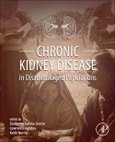Chronic Kidney Disease in Disadvantaged Populations investigates the increased incidence and prevalence of kidney disease in vulnerable populations world-wide. The volume explores the complex interactions of genetic, biologic, cultural and socioeconomic factors such as the environment, and specific health behaviors that seem to be responsible for a significant proportion of the health disparities in these communities. Each chapter is written by leading experts in the field and analyzes the prevalence and incidence of pre-dialysis kidney disease in disadvantaged populations across both developed and developing countries. In addition, each contribution analyzes differentiated risk factors and compares the disparities in access to screening, prevention strategies, treatment protocols and renal replacement therapies. Chronic Kidney Disease in Disadvantaged Populations is essential reading for residents, fellows, clinicians and biomedical researchers working in nephrology, internal medicine, and epidemiology, especially those working in areas with high concentrations of disadvantaged populations.
Please Note: This is an On Demand product, delivery may take up to 11 working days after payment has been received.
Table of Contents
Section 1: Introduction 1. Introduction
Section 2: Burden of Disease: Prevalence of pre-dialysis kidney disease in disadvantaged populations in developed countries 2. Canada 3. Prevalence of pre-dialysis kidney disease in disadvantaged populations in developed countries-United States 4. Chronic kidney disease in China
Section 3: Burden of disease: Prevalence and incidence of pre-dialysis kidney disease in disadvantaged populations in developing countries 5. Integration of Chronic Kidney Disease Prevention into the Uruguayan National Programme for Noncommunicable Diseases 6. Prevalence of chronic kidney disease and associated risk factors in Cuba Section 4: Disparities in ESRD among disadvantaged populations 7. ESRD among indigenous populations in Canada 8. Racial differences in kidney disease and end-stage kidney disease in the USA 9. ESRD in Mexico 10. End stage renal disease in Latin America 11. Kidney Disease in Ethnic Minority Populations in the United Kingdom 12. End-Stage Renal Disease in the Middle East 13. End Stage Renal Disease (ESKD) in Egypt and North Africa 14. End Stage Renal Disease in Sub-Saharan Africa 15. Kidney Disease in South Asia 16. ESRD in South-East Asia 17. Kidney Disease in Maori and Pacific people in New Zealand 18. Kidney Disease among Aboriginal and Torres Strait Islander people in Australia
Section 5: Current view on risk factors 19. Current view on CKD risk factors: Traditional, non-communicable diseases: diabetes, hypertension, and obesity 20. Risk Factors for Kidney Disease in Disadvantaged Populations Communicable diseases, environmental factors, pollutants 21. Poverty and Renal Disease
Section 6: Unique issues in kidney disease among disadvantaged populations 22. Mesoamerican Nephropathy or Chronic Kidney Disease of Unknown Origin 23. Prematurity, low birthweight and CKD 24. Hypovitaminosis D and Progression of CKD 25. Renal Care in an Unequal World: anthropological reflections 26. Developing nephrology programs in low resource settings 27. Renal transplantation in low resource settings 28. Renal Transplantation, the Iranian Model
Section 7: CKD screening and prevention strategies in disadvantaged populations 29. Developing a Rational Approach for Chronic Kidney Disease Identification: Population Based vs. Targeted Screening Studies 30. CKD screening in Mexico 31. The role of primary health care professionals 32. Chronic Kidney Disease in Disadvantaged Populations 33. Integration of Chronic Kidney Disease Prevention into the Uruguayan National Programme for Noncommunicable Diseases 34. Integration of Chronic Kidney Disease Prevention into Non-communicable Diseases Programs in Cuba 35. Raising awareness. The World Kidney Day Initiative








